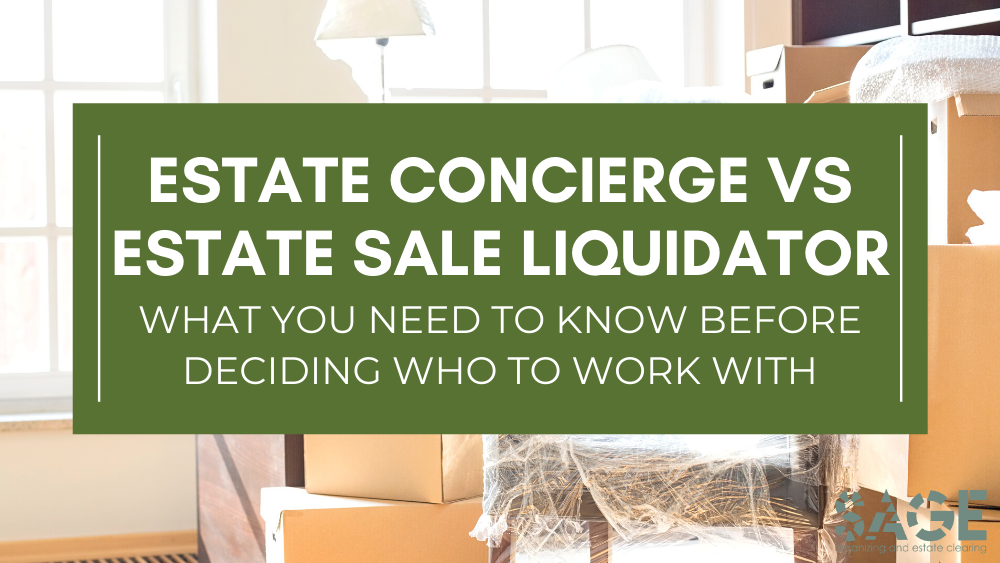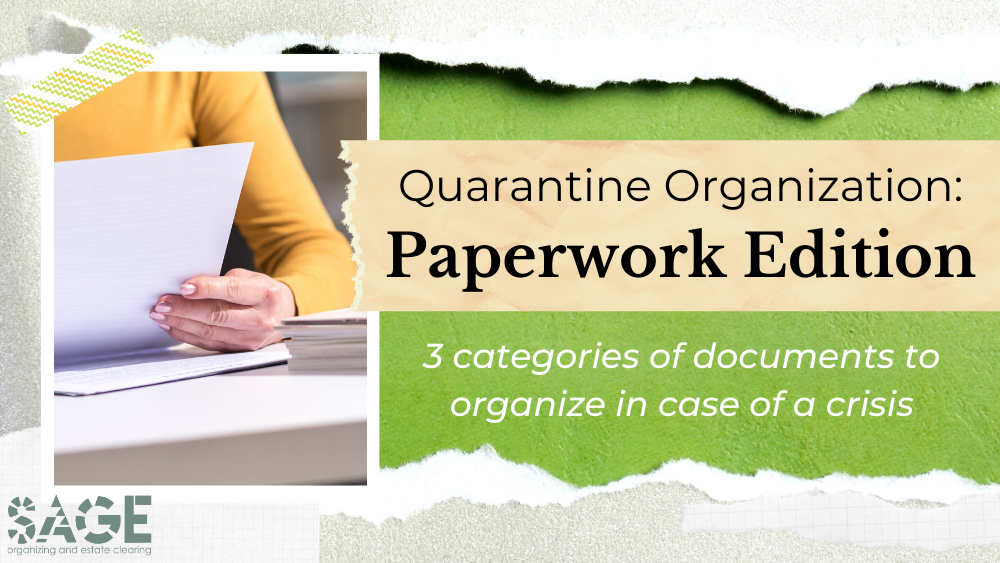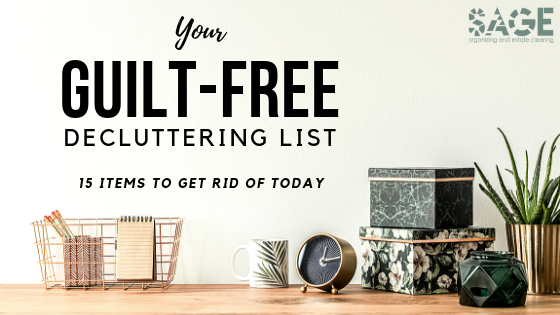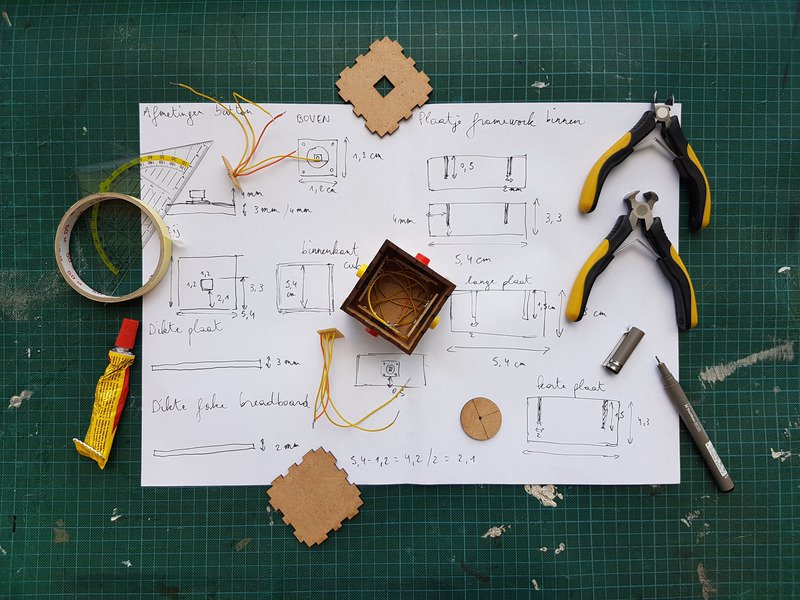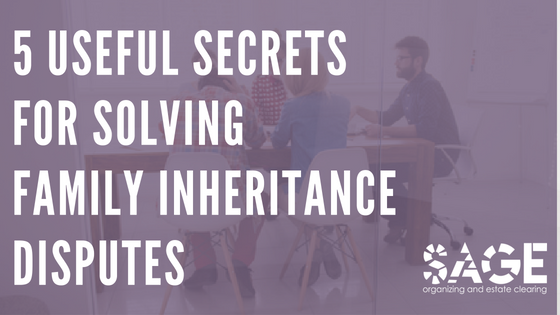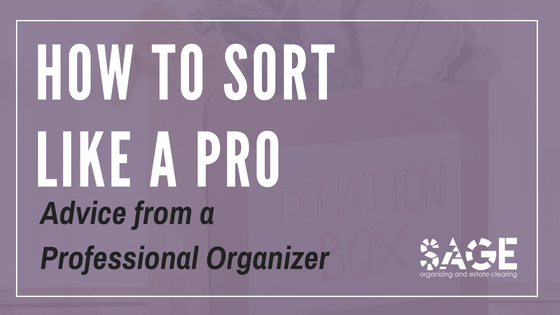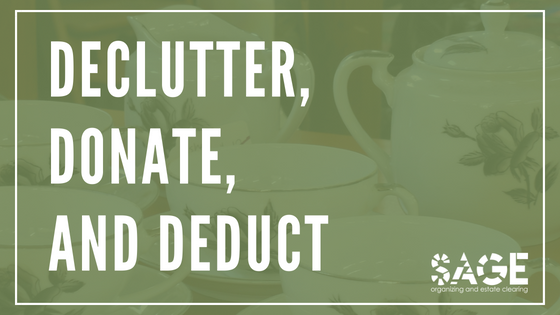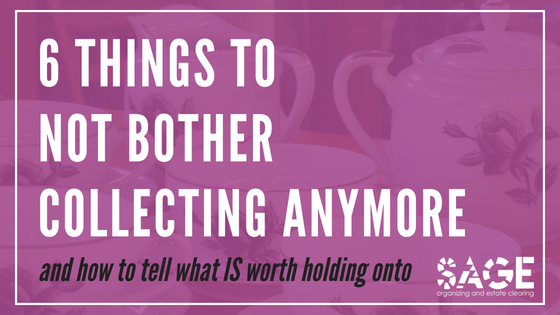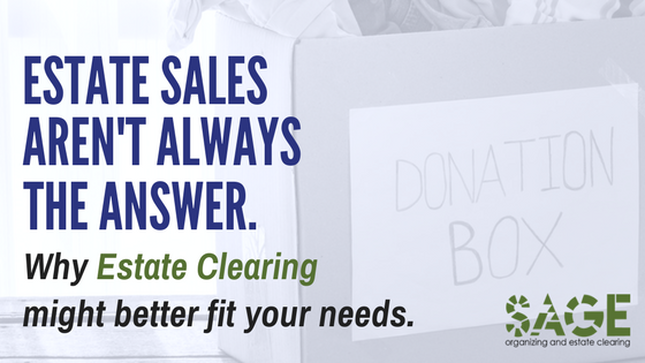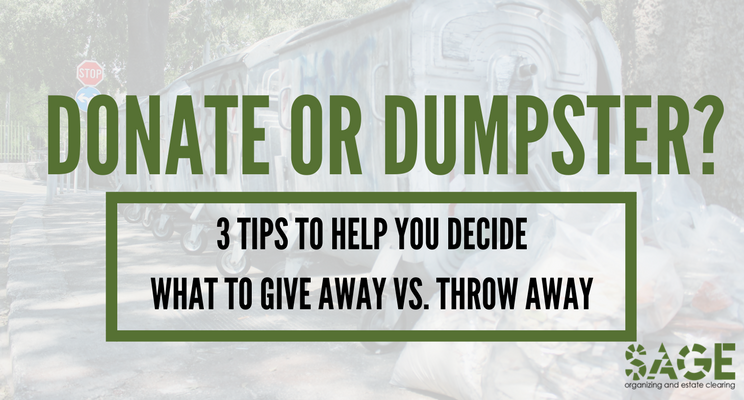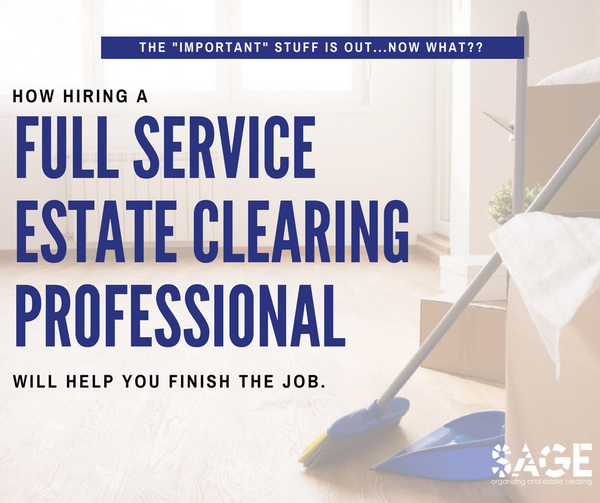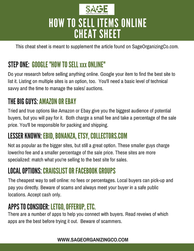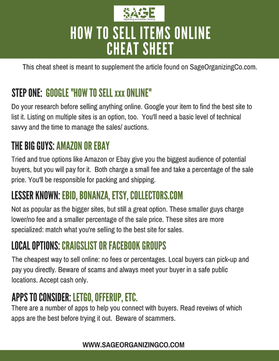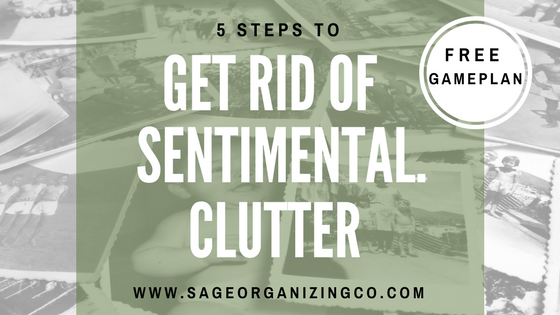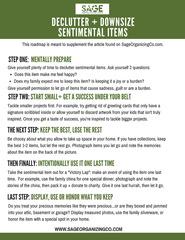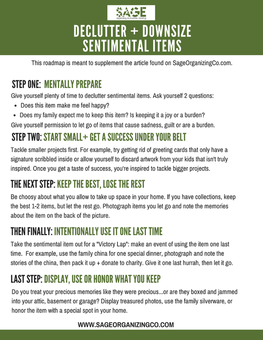|
Estate executors have a lot of responsibility on their shoulders. They are expected to make important decisions about the estate at hand including what will happen with their loved one's property. The workload and logistics that come along with clearing out a home is overwhelming. Most estate executors look to professionals for guidance and help through this emotionally and physically draining process-- but who should you hire? Estate Sale Liquidators may be the more common route, but Estate Concierges provide conveniences designed to make the estate executor's life easier. Some of the differences between estate liquidators and estate concierges are: 1. Estate Concierges can empty a home in one week from start to finish whereas just a consultation with an Estate Liquidator can take weeks to months. Who wants to drag the process out longer than necessary? 2. A significant benefit when choosing an Estate Concierge is they will coordinate with family, realtors, sellers, charities, attorneys, and home repair vendors, painters, cleaners, etc. and more. Estate Concierges handle all the details while Estate Liquidators work with the family and just one charity. 3. Estate Concierges explain all your selling options: estate sales, auctions, consignment, appraisals, and private sales. It's not uncommon for an estate concierge to clear a home, donate the majority of the items, and also help organize an estate sale for some of the "big ticket" items left. Estate Liquidators, on the other hand, only explain their process and are far less flexible in incorporating other selling options. 4. Estate Concierges secure any found valuables, documents, photos, financial paperwork, medications, etc. during the clearing process. When working with an Estate Liquidator, clients are expected to locate and remove all valuables and sensitive items before going under contract. 5. When you choose an Estate Concierge, they will thoughtfully match donations from home to best local charities. Estate Liquidators simply send all remaining items to GoodWill. 6. One of the greatest conveniences Estate Concierges offer is providing the client with an itemized tax donations report and photos required for the final tax return of the estate. Estate Liquidators only provide a receipt without itemization. 7. Estate Concierges submit a final report to the estate executor with all receipts, tax documentation, recommendations, and more. All estate executors receive from an Estate Liquidator at the end of the process is a check for the sale amount minus commission. Overall, Estate Concierges offer more flexibility, efficiency, and direct benefits for the estate executor. Being an executor of an estate is a stressful job, Estate Concierges prioritize the estate executor's experience and do what is possible to make the process seamless. Hopefully this article has helped you decide between an Estate Concierge or Estate Sale Liquidator. If you have any questions, be sure to leave a comment! Related Articles:
Quarantine Organization: Organize your "Crisis Paperwork" 5 Useful Secrets for Solving Family Inheritance Disputes Declutter, Donate, and Deduct Professional Disclaimer: The ideas, recommendations, and opinions on this website, blog, and made in person are for educational and entertainment purposes only, and should not be considered legal, financial, or medical advice. I am not an attorney, doctor, or licensed financial professional. Sage Organizing Co., LLC is not liable for any losses or damages related to actions or failure to act related to the content of this website, blog, or in-person discussions. If you need specific legal, financial, or medical advice, consult a professional in your area.
0 Comments
Hiya fellow Quarantine Queens! I've been seeing a lot of posts swirling around the internet about banana bread, Tik Tok dances, and other activities to keep us busy at home. Many of my friends have texting me asking, "Alright Candi, I finally have some time to get my life together. I want to get an organizing project done but not sure what to tackle?" I don't know about you all, but being in quarantine has not only freed up some time for me, it has also made me think about organizing some of the essential "crisis" paperwork. Now, you may be wondering, "Candi, my favorite professional organizer, what in the world is 'crisis' paperwork!?" Well, I am so glad you asked! I'm about to fill you in. Crisis paperwork is paperwork that is important and and helpful during . . . you guessed it. . . a crisis- I'm here all night ladies and gentleman, well, and morning and afternoon, actually right now I'm here at home everyday all day. Okay okay, back to paperwork organization. Crisis paperwork, you may find, is what many consider death or doom + gloom paperwork. However, I have found: Using the phrase "Death Papers:" -Major bummer -Feelings of sadness -Denial settles in Using the phrase "Crisis Papers:" -Confident -Feelings of preparedness -Ready to take on the world As an estate clearing professional, I have seen the tremendous confusion and concerns that have arisen when a crisis occurs and necessary paperwork/important documents are either uncompleted and/or can't be located. During a crisis, emotions are already running high and stress is inevitable. Make it easier for you and/or your loved ones by identifying and completing your crisis paperwork NOW and organizing it in a designated space away from other miscellaneous paper. Here are the three categories of paperwork to organize your life for a crisis: 1. Healthcare Forms Healthcare forms that are essential to have finished and organized before a crisis include Healthcare Power of Attorney AND a Living Will. These two documents often go hand-in-hand and help protect your wishes as far as health and medical care while you are still alive. There are many situations and crises that would involve you being alive but unable to communicate what kind of medical treatment you want. Now, let me tell you why it's important to have BOTH of these documents. A Living Will lists out your desire or refusal of medical treatment if you are either permanently unconscious or terminally ill. This is an important document to organize before a crisis like the above to reduce emotional stress on loved ones as best as possible and to ensure you are being cared for the way YOU want. However, a Living Will is only used if the patient is deemed permanently unconscious. If you are temporarily incapacitated and are expected to recover, a Living Will does not take effect, therefore; the only person who could make medical decisions on your behalf (even if you're in a freakin' coma) would be a pre-designated Health Care Power of Attorney-- this is why it is ESSENTIAL to have both of these forms completed. I have conveniently included a link to your Health Care Power of Attorney and Living Will combined form ONLINE here. Take the time now in quarantine to go online and complete these essential documents to protect yourself and reduce the strain on family members. PRO TIP: Once you're done completing the forms, make sure your Health Care Power of Attorney has the original copy deeming his or her authority, you have a copy, and your healthcare providers also have a copy to put in your medical records. 2. Vital Life Documents This category of documents includes:
I HIGHLY recommend ordering an accordion file folder like this one on Amazon to keep all of your vital life documents together. Take advantage of the labels and use the bullets I listed above to create labels for each pocket. One step further, add a large label to the outside of the folder that says "Vital Life Docs." You don't need a fancy label maker, paper and tape work great! If you have a home office, store the accordion file there. If not, find another easy to access place. 3. Legacy Documents Legacy documents you should organize in case of a crisis are Last Will + Testament, records of all banking accounts, and list of all insurance policies. A Last Will and Testament is defined by LegalZoom.com as "A legal document that lets you, the testator (the person making the will), designate individuals or charities to receive your property and possessions when you pass away. . . A last will also allows you to name a guardian to care for minor children. The main purpose of a will is to ensure that the testator's wishes, and not the default laws of the state, will be followed upon the testator's death." This form is pretty self explanatory on why it is extremely important to have completed and organized before a crisis. You can easily create your Last Will and Testament online with Legal Zoom here. You'll also need to create a list of bank, investment, retirement/pension account numbers to ensure that all accounts are protected and resolved in case of a serious crisis. Lastly, compile all of your insurance policies-- most importantly your life insurance policy! Again, I highly recommend grabbing a second accordion file for this category of paperwork and following the instructions in step two for these documents. Phew, and that's all I got for you today folks! I GUARANTEE if you take the time to complete and organize the above documents, you will feel like you have your life together and more importantly you will be PREPARED in case of a crisis. Quarantine time really puts things into perspective and reminds us how fragile and valuable life is. Take care of yourself and make things easier on trusted family and friends by organizing the above "Crisis Paperwork." Have questions on any of the listed forms or documents? Comment below! If you're looking for more organization ideas and tips, follow Sage Organizing Co. onPinterest! Need more help with organizing your home or estate clearing? Contact us and book a consultation to start your organized life today! Professional Disclaimer: The ideas, recommendations, and opinions on this website, blog, and made in person are for educational and entertainment purposes only, and should not be considered legal, financial, or medical advice. I am not an attorney, doctor, or licensed financial professional. Sage Organizing Co., LLC is not liable for any losses or damages related to actions or failure to act related to the content of this website, blog, or in-person discussions. If you need specific legal, financial, or medical advice, consult a professional in your area.
Before you can get properly organized, it is important to declutter your home! Now wait, I can already hear you saying, "That's great Candi, but where do I START?!" I totally understand what you mean. It can be hard to decide what to give away and what to keep especially when we feel attached many items in our home. How many times have you thought, "Well, maybe I'll need this sometime in the distant future?" or "What if I regret/feel guilty about getting rid of this?" I know the feeling and that is why I am here to help! I have compiled a short list of 15 items you should NOT feel bad about getting rid of. Whether you are planning on moving, recently moved, or just plain tired of the disorganization, this list will guide you in starting to declutter your home. Some items on the list can definitely be thrown away, but I highly recommend you consider the condition of the item first and if it should be donated so that somebody else can benefit from it. Your GUILT-FREE Decluttering List 1. Old nail polishes and expired skincare/makeup 2. Clothing you haven't worn in years or clothing you bought years ago but never wore 3. Games and puzzles with missing pieces 4. Old children's toys and dog toys (this is important not only for decluttering but for sanitary purposes too!) 5. Books, including recipe books, that you don't plan on reading again or reading at all (be honest with yourself here) 6. Mostly empty cleaning supplies/bottles and condiment bottles 7. Broken jewelry or jewelry you never wear including watches 8. Old receipts, coupons, flyers, notes, and paper (If there is info you REALLY need, transfer it to a document on your computer/phone!) 9. Children's art work, completed school work, and old baby clothes... narrow down to just a few of these if you want memories or take photos on your phone. I know it can be hard, but you definitely don't need all of it! 10. Pens, markers, and any other craft supplies that are old or excessive 11. Old/frayed underwear, socks, and undergarments 12. Plastic bags from grocery and shopping stores 13. DVD's, CD's, and VCR tapes as well as old electronic players 14. Old, damaged cooking utensils such as spatulas and cooking spoons 15. Old or worn rugs, towels, and blankets (I especially like to switch out my old hand towels with new ones so I always have bright white and fresh towels in the bathroom!) Phew, and that's it folks! Of course, this isn't a comprehensive list for everything you need to get rid of, but it's a good place to start. And, let me remind you one last time, you do NOT need to feel guilty about throwing away or donating any of the items I listed! If you're looking for more organization ideas and tips, follow Sage Organizing Co. onPinterest! Need more help with organizing your home? Contact us and book a consultation to start your organized life today!
Professional Disclaimer: The ideas, recommendations, and opinions on this website, blog, and made in person are for educational and entertainment purposes only, and should not be considered legal, financial, or medical advice. I am not an attorney, doctor, or licensed financial professional. Sage Organizing Co., LLC is not liable for any losses or damages related to actions or failure to act related to the content of this website, blog, or in-person discussions. If you need specific legal, financial, or medical advice, consult a professional in your area. Many of us grow up dreaming about the big, beautiful home we are going to have with our spouse and future children. We drive through neighborhoods in our hometowns thinking about what our ideal home would look like and fantasize about each family member having their own bathroom! However, there comes a point in time where we reconsider what we truly want. Is a big home really what we still want later in life? It is normal to think maybe it is time to downsize once all the kids are grown, but it is also hard to let go of the house we have a sentimental attachment to and where sweet memories were created. Though it can be emotionally confusing, downsizing may be a great decision for you. Sage Organizing Co. is here to give you a few ways to know if downsizing is right for you. 1. You're struggling to keep up with the maintenance and necessary repairsWhether it be financially, physically, or emotionally, if keeping up with home maintenance and repairs is difficult, it may be time for you to consider downsizing. It can be terribly frustrating when it feels like there is ALWAYS something to be fixed in your house. Right when you're done fixing and paying for one repair, another thing breaks! Not only is this frustrating but constant repairs and maintenance is time-consuming and expensive. The smaller the house you live in, the fewer things there are to break and keep up with. 2. You're planning on retiring soon and live far from familyMany people decide to downsize once they retire as this leaves more flexibility in retirement income. Additionally, it gives you more time to focus on your health and happiness. Many people who plan on retiring soon decide on a smaller home without steps that will be hassle-free. Downsizing is also a perfect opportunity for retirees to move close to children and grandchildren who can help in the future. 3. You feel overwhelmed with all of your "stuff"We often feel a need to fill all the empty space once we move into a big house. As time passes, "stuff" accumulates. Sometimes you look around the house and don't even realize all the things you own! Other times we prefer to live in denial and never open the forbidden cabinets that have an unknown number of items in them. Once you've truly accepted that less really is more, it may be time for you to downsize. A smaller home will force you to reduce the stuff you have and really focus on what you truly need. 4. You feel "house poor" and sacrifice dreams because of itIf housing costs are preventing you from traveling and enjoying life's luxuries, downsizing is probably a good option for you. Moving into a smaller home or even an apartment/condo/townhome requires little maintenance which makes it possible for you to travel for longer periods and have the money to do so! Even if traveling isn't your thing, downsizing frees up money that can be spent on the things you are really wanting to try. Even if you now see that downsizing is right for you, you may be worried about the stress and complication of the process. ⠀ Not only do you have to move your things, you also have to decide what you want to keep and what you want to discard. THEN, you have to figure out the best way to discard your unwanted things.⠀ ⠀ Skip the stress and call Sage! Sage Organizing Co. will help you organize your valuables, pack them, and donate your unwanted items to local charities. ♻️⠀Comment below with any questions! ⠀ Let Sage make your downsize go smoothly and put your unwanted things to good use around the community. Contact us for more information! Professional Disclaimer: The ideas, recommendations, and opinions on this website, blog, and made in person are for educational and entertainment purposes only, and should not be considered legal, financial, or medical advice. I am not an attorney, doctor, or licensed financial professional. Sage Organizing Co., LLC is not liable for any losses or damages related to actions or failure to act related to the content of this website, blog, or in-person discussions. If you need specific legal, financial, or medical advice, consult a professional in your area.
It is a fact: in most family inheritance disputes, the only people who end up financially benefiting are the lawyers involved. But it doesn’t have to be that way! By organizing, documenting, and talking about your wishes early and often, you can solve family battles before they even begin. want to learn the 5 useful secrets for solving family inheritance disputes? read on...organize and document your wishesLong before it is necessary, start organizing and documenting your wishes. This means putting your wishes for “who gets what” in writing, preferable a legally binding will. Hire a lawyer to prepare the will, or create one yourself online at a reputable online company (such as LegalZoom). For example, if the eldest son is to inherit the family wedding ring so that he can keep it in the family, document it. Without express written decisions made in advance, family disputes can rise up. Tell your heirs your wishes so there are no unpleasant surprises after you’re gone. honor written wishesWhen a family member has passed away, the will is the legal document that has primary precedence is dividing up the remaining personal belongings, according to the law. It doesn’t matter if Grandma always told everyone that Billy should get the art collection: if it’s not in writing, it doesn’t legally count. If the deceased prepared an informal list of their wishes (or marked items with labels, as some people do) AND the heirs can agree to it, try to honor those wishes. The only people who financially benefit from estate battles are the lawyers involved. Related Articles: Sometimes You Can’t Do it on Your Own: When it’s Time to Throw in the Towel and Hire an Estate Clearing Professional to Help you Finish the Job Nobody Wants the Family Heirlooms: What to Do When it Happens to You with free Declutter +Downsize Family Heirlooms Game Plan Mom, We Have to Talk: 5 Ways to Discuss Downsizing with your Aging Parents with printable Discussion Cheat Sheet Don't remove anything from the house ahead of timeIf an ailing, aging parent remains in the home and starts “giving away” valuables or cash, the right thing to do is share that information with all the heirs. Often times the adult child who is the perceived “favorite” benefits from this: this is a sure way to cause family disputes in the future. Take the high road and disclose to other heirs what has already been given to you. After a family member passes, one of the very first things the Executor should do is change the locks to the house. This measure will prevent any neighbors, service providers, or unscrupulous heirs from “helping themselves” to belongings in the house. Nothing should be removed from the house until all the heirs can go through the home together. Always act with integrity and transparency to avoid family disputes over the belongings. immediate heirs onlyWhen it comes time for the heirs to organize and divide up the belongings, it should be the immediate heirs only. This means no spouses, children, grandchildren, or close family friends. Reducing the number of people involved will streamline the process and keep it simple. Related Articles: Help Organize Your Aging Parents (While They are Young + Healthy) with printable guide: Two Easyish Conversations to Have with Your Aging Parents Declutter, Donate, and Deduct 6 Things to Not Bother Collecting Anymore (and How to Tell What IS Worth Holding Onto) agree on a fair way to divide items equitablyBefore the heirs begin dividing up belongings, agree to a fair way to divide things up. Consider these ideas:
SummaryTake the time now to organize, document and talk about your inheritance wishes with your family. It will solve future battles before they even begin. Professional Disclaimer: The ideas, recommendations, and opinions on this website, blog, and made in person are for educational and entertainment purposes only, and should not be considered legal, financial, or medical advice. I am not an attorney, doctor, or licensed financial professional. Sage Organizing Co., LLC is not liable for any losses or damages related to actions or failure to act related to the content of this website, blog, or in-person discussions. If you need specific legal, financial, or medical advice, consult a professional in your area.
Whether you are organizing one room in your house or decluttering a home full of stuff, knowing how to efficiently sort is crucial to your success. Professional Organizers use the tips and tricks on this checklist to help clients, and now I'm sharing those hacks with you.
Ready to learn a professional organizer's tips for Sorting? Read on...Set yourself up for success
Before starting any organizing or decluttering job, make sure you have all the supplies you need before you get started.
Tools/ Supplies Needed:
Keep
The first step is to sort your "keepers" into a pile or one area. Keep items that you love and actively use. Items that aren't actively used should be moved into a long term storage area, such as a basement or attic.
Tools/ Supplies Needed:
*available space in actively used items *temperature variation in for long term solutions *transporting “keepers” to new location, if applicable Sell
Don't love it, but you'd like to make a little money from it? Consider selling online or offline.
Tools/Supplies Needed:
Related Articles
6 Things to Not Bother Collecting Anymore Nobody Wants Family Heirlooms: What to Do When it Happens to You. Gift These 5 Wonderful Experiences To the Ones You Love..Instead of Buying "Stuff" Donate
Have items that don't need to live with you anymore, but are still in great condition? Give to a local charity.
Tools Needed:
Discard
Some things just need to be discarded. If the items can't be sold or donated, its time for the trash/ recycling bin.
Tools Needed:
Related Articles
HOW TO DOWNSIZE YOUR HOME BEFORE MOVING 4 Smart Ideas to Sell Your Stuff Offline and 1 Really Dumb One with free printable How to Sell Items Offline Cheat Sheet 5 Tips to Sell Your Stuff Online with free printable How to Sell Items Online Cheat Sheet YOU'RE ready to sort like a pro!
Using this checklist, you now have the tools to Keep, Sell, Donate or Discard when you are decluttering and organizing.
Professional Disclaimer: The ideas, recommendations, and opinions on this website, blog, and made in person are for educational and entertainment purposes only, and should not be considered legal, financial, or medical advice. I am not an attorney, doctor, or licensed financial professional. Sage Organizing Co., LLC is not liable for any losses or damages related to actions or failure to act related to the content of this website, blog, or in-person discussions. If you need specific legal, financial, or medical advice, consult a professional in your area.
Decluttering your home and donating your items to local non-profit groups is a fantastic way to organize your home...and get a tax deduction.
Disclaimer: This information is compiled from many sources and is not intended as tax, investment, financial planning or legal advice and should not be relied upon as such. For tax, investment, financial planning or legal advice you are encouraged to consult with your personal advisers
Ready to learn how to Declutter, donate and Deduct? Read on...Declutter
When the organizing and decluttering bug strikes, separate things out to Keep, Discard, or Donate/Recycle piles.
Trying to figure out what you can easily declutter AND have it make a difference in your local community?
Donate
Before donating, be sure you are giving to an organization that is a 501 (c)(3) by the IRS. These are organizations that are recognized by the IRS as being tax-exempt by virtue of their charitable programs.
“Big name” charities (think Goodwill, Habitat for Humanity, or the Salvation Army) are no-brainers, but if you’re unsure about a group you’re thinking of giving to, you can always check their website or a site that vets non-profit groups, like Charity Navigator. Have big stuff to donate, but no truck and/or the muscles to get it done? Try the website Pick Up My Donation: they will find a non-profit group within 15 miles of your zip code and set up the pick-up, at no cost to you. Be sure you get a receipt or donation acceptance letter from the non-profit you give to. Keep a file in your glove box or console to organize on-the-go receipts, then transfer them into a permanent file in the house regularly.
Related Articles
Donate or Dumpster?: 3 Tips to Know What to Give Away vs. Throw Away 6 Things to Not Bother Collecting Anymore (and How to Tell What IS Worth Holding Onto) How to Beautifully Stage Your Home So it Sells in a Flash Deduct
Even though the standardized deduction for individuals and married couples has increased in 2018, it’s still a good idea to keep records of your charitable giving.
Keep track of what you give!
get organized and do good!
Decluttering, donating and deducting is a great way to organize your home, while making a difference in your community at the same time.
Professional Disclaimer: The ideas, recommendations, and opinions on this website, blog, and made in person are for educational and entertainment purposes only, and should not be considered legal, financial, or medical advice. I am not an attorney, doctor, or licensed financial professional. Sage Organizing Co., LLC is not liable for any losses or damages related to actions or failure to act related to the content of this website, blog, or in-person discussions. If you need specific legal, financial, or medical advice, consult a professional in your area.
Related Articles:
Sometimes You Can’t Do it on Your Own: When it’s Time to Throw in the Towel and Hire an Estate Clearing Professional to Help you Finish the Job. Nobody Wants the Family Heirlooms: What to Do When it Happens to You 5 Steps to Get Rid of Sentimental Clutter
How do you know which things in your collections have lost value over the years, and which are worth keeping? It can be tough to tell!
Items that your parents (or you) paid a lot of money for back in the day are now worth much, much less than was paid for them. An aging population has caused a heavily flooded market, making "valuables" less so. As a Professional Organizer and Estate Clearing Specialist, I see a lot of these collectibles in homes. Some are worth keeping, but unfortunately, most are not. Want to know what is worthless and how to tell the difference? Read On.
Loss in Value: Figurines and Commemorative Plates
|
|
Just for our readers, we’ve created this nifty How to Sell Your Items Online Cheat Sheet. Download and enjoy!
|
Step One: Google “How to Sell xxx Online”
You want to list your item on the site that has the biggest audience of potential buyers. For instance, if you were selling a set of golf clubs online, Ebay may be the best bet. But if you were selling custom hand-embroidered tea towels, Etsy is where you want to be. Selling antiques and collectibles often is easier on sites dedicated to those items.
The Big Guys: Ebay and Amazon
Both platforms have incredibly large audiences, thereby increasing your chances of selling your item quickly. There are fees associated with using both services, so be sure you are aware of what you are agreeing to before listing your items.
Nobody Want the Family Heirlooms
With Declutter +Downsize Family Heirlooms Game Plan
4 Smart Ideas to Sell Your Stuff Offline and 1 Really Dumb One
With How To Sell Items Offline Cheat Sheet
Sometimes You Can’t Do it on Your Own: When it’s Time to Throw in the Towel and Hire an Estate Clearing Professional to Help you Finish the Job.
Lesser Known: Ebid, Bonanza, Etsy, Collectors.com
Ebid is a site that is similar to Ebay, but doesn’t have the same amount of traffic. If you’re selling on Ebid, you’ll want to market your items elsewhere, too. On the plus side, however, EBid has lower fees than the big guys.
Bonanza is a great option for selling more unique and quirky items. Bonanza has a large audience, has no listing fee, and a low commission percentage compared to Ebay.
Collectors.com is a great option to sell your collectibles online.
Local Options: Craigslist or Facebook Groups
If you live in an area that has an active Craigslist community, try listing your item there. Photos are key to selling your items. Use common sense and caution when meeting with buyers: only accept cash and meet in public places.
If you live in a community without a lot of Craiglist action, selling your stuff in Facebook Groups is a great option. Find local Facebook groups to list your items and be sure to follow all the rules. You’ll keep all the profits of selling via Facebook
Estate Sales Aren't Always the Answer: Why Estate Clearing Might Better Fit Your Needs
5 Steps to Get Rid of Sentimental Clutter
With Declutter + Downsize Sentimental Items Game Plan
Mentally Prepare for Downsizing Your Home: 4 Tips to Control Your Emotions
With Downsizing Your Home Emotional Roadmap
Apps to Consider: Letgo, Offerup, Etc.
Apps like LetGo, OfferUp, and 5Miles, etc. are certainly options, however, many users complain about spammers, failure to show up to buy, etc. Be sure to read reviews from users before signing up for an app.
You Can Sell Your Stuff Online!
Leave a comment to let us know how your sale went!
Professional Disclaimer: The ideas, recommendations, and opinions on this website, blog, and made in person are for educational and entertainment purposes only, and should not be considered legal, financial, or medical advice. I am not an attorney, doctor, or licensed financial professional. Sage Organizing Co., LLC is not liable for any losses or damages related to actions or failure to act related to the content of this website, blog, or in-person discussions. If you need specific legal, financial, or medical advice, consult a professional in your area.
|
Download your free How to Sell Items Online Cheat Sheet here.
|
As an Estate Clearing Professional and Professional Organizer, I see entire rooms, closets, attics, garages, and even cars overflowing with things people can't get rid of for sentimental reasons. People are using their homes as storage facilities instead of places to actively live their lives.
In this post I'll be sharing some of my professional tips to help you get rid of some (but not all) of your sentimental clutter.
|
To help get you ready to declutter and downsize your sentimental items, I've created this free download. Enjoy!
|
Ready to get rid of some of your sentimental clutter? Keep Reading…
#1 Mentally Prepare
Take some time to think about why you are holding on to so many sentimental items. Is it because you truly treasure the item? Or does the item remind you of a person?
Remember, a thing is just a thing, not a person. Don't let your love for a Grandfather morph into love of a thing that reminds you of that him.
Ask yourself some questions as you go through items
- Does it make me feel happy? Keeping mementos of sad times or events doesn't make your life better. Let it go.
- Does my family expect me to keep this? Family expectations can be difficult to manage. Have you become the Keeper of all Historical Photos Since the Beginning of Time, but no one can identify any of the people in those pictures? Let them go.
- Is keeping it a joy or a burden? Are you excited that you have this item? Or is it more like “I guess I should keep this”? Let it go.
If you decide to let the item go, that is your choice: you do not need to announce it to your family. Just let it go.
Nobody Wants the Family Heirlooms: What to Do When It Happens to You
with free Declutter +Downsize Family Heirlooms Game Plan
Sometimes You Can’t Do it on Your Own: When it’s Time to Throw in the Towel and Hire an Estate Clearing Professional to Help you Finish the Job.
Help Organize Your Aging Parents (While They are Young + Healthy)
with free printable: Two Easy-ish Conversations to Have with Your Aging Parents
Mentally Prepare for Downsizing Your Home: 4 Tips to Control Your Emotions
with free Downsizing Your Home Emotional Roadmap
#2 Start Small: Get a success or 2 under your belt
Taken care of all the easy little things? Then move on to a little bigger (but not huge) project. Try clearing out your t-shirt drawers of all the shirts you don’t really wear, you just keep because of the sentimental memories.
How about all your old college textbooks, student directories, and papers? You may want to keep the directory, just to see the old photos, but you should be able to feel confident about donating or recycling all the books and papers. I guarantee you are not going to need your essay on post-modern theory in 19th century American literature ever again.
Remember, you don’t need to get rid of ALL your sentimental items. Just weed out the clutter so you have room for the things that truly mean something to you.
#3 Keep the Best, Lose the Rest
Having a tough time letting the collection go? Photograph the items!
What if you DO have enough room in your house to store all your sentimental clutter? There is still space in the attic! You can shove one more box underneath the stairs? Skip right on to Step #5!
#4 Intentionally Use It One Last time
Let’s say you’ve weeded out 20 old sports or concert t-shirts that you don’t need anymore, but can’t bear to discard or donate. Using the “soft goodbye”, allow yourself to wear it one last time and then instead of washing it, put it into the Goodwill bag. This lets you ease out of owning it without a blunt end.
Mom, We Have to Talk: 5 Ways to Discuss Downsizing with your Aging Parents
with free Discussion Cheat Sheet
Assess the Mess: How to Plan Out Downsizing a Home
includes free Room-by-Room Checklist
4 Smart Ideas for Selling Your Stuff Offline...and 1 Really Dumb One
with free cheat sheet
#5 Display, Use or Honor what you keep
Have tons of photos? Scan them in and set them as a slideshow on your computer. How fun is it to randomly see your 8th grade graduation photo? Put them in a pretty bowl on your coffee table for guests and family to look through and change the pictures out every couple of months.
Honor items that truly have a place in your heart by displaying them in your home. Have a ceramic bowl you made in art class in 3rd grade? Pull it out of storage and use it as a change bowl. Keeping you child's baby blanket they came home from the hospital in? Cut it into dish towels so you can use and enjoy seeing it everyday!
YOu are ready to get rid of (some, but not all) of your sentimental clutter.
Professional Disclaimer: The ideas, recommendations, and opinions on this website, blog, and made in person are for educational and entertainment purposes only, and should not be considered legal, financial, or medical advice. I am not an attorney, doctor, or licensed financial professional. Sage Organizing Co., LLC is not liable for any losses or damages related to actions or failure to act related to the content of this website, blog, or in-person discussions. If you need specific legal, financial, or medical advice, consult a professional in your area.
|
To get you started on your decluttering journey, we're sharing this Declutter + Downsize Sentimental Items Game Plan. Enjoy...and Good Luck!
|
Related Articles
with free Declutter +Downsize Family Heirlooms Game Plan
Help Organize Your Aging Parents (While They are Young + Healthy)
with free printable: Two Easy-ish Conversations to Have with Your Aging Parents
Mentally Prepare for Downsizing Your Home: 4 Tips to Control Your Emotions
with free Downsizing Your Home Emotional Roadmap
Mom, We Have to Talk: 5 Ways to Discuss Downsizing with your Aging Parents
with free Discussion Cheat Sheet
Assess the Mess: How to Plan Out Downsizing a Home
includes free Room-by-Room Checklist
Categories
All
Back To Schoool
Before & After
Closet Organization Ideas + Hacks
Decluttering Your Home
Downsizing Your Home
Estate Clearing
Family Heirlooms
Family Schedule Logistics
Free Download
Garage DIY Organization
Garage Mudroom
Grocery Planning
Holiday Organizing
Home Organizing
Later Life Planning
Meal Planning
Mental Health
Moving
Organizing Aging Parents
Organizing Products
Selling Offline
Selling Your Stuff
Sentimental Items
Weekly Family Routine
Looking for something?
Archives
November 2023
October 2023
September 2023
April 2021
March 2021
February 2021
January 2021
December 2020
November 2020
October 2020
September 2020
August 2020
July 2020
June 2020
May 2020
April 2020
March 2020
February 2020
January 2020
December 2019
November 2019
October 2019
September 2019
May 2019
April 2019
March 2019
November 2018
October 2018
September 2018
July 2018
June 2018
May 2018
April 2018
March 2018
February 2018
January 2018
December 2017
November 2017
October 2017
September 2017
August 2017
June 2017
May 2017
April 2017
March 2017

